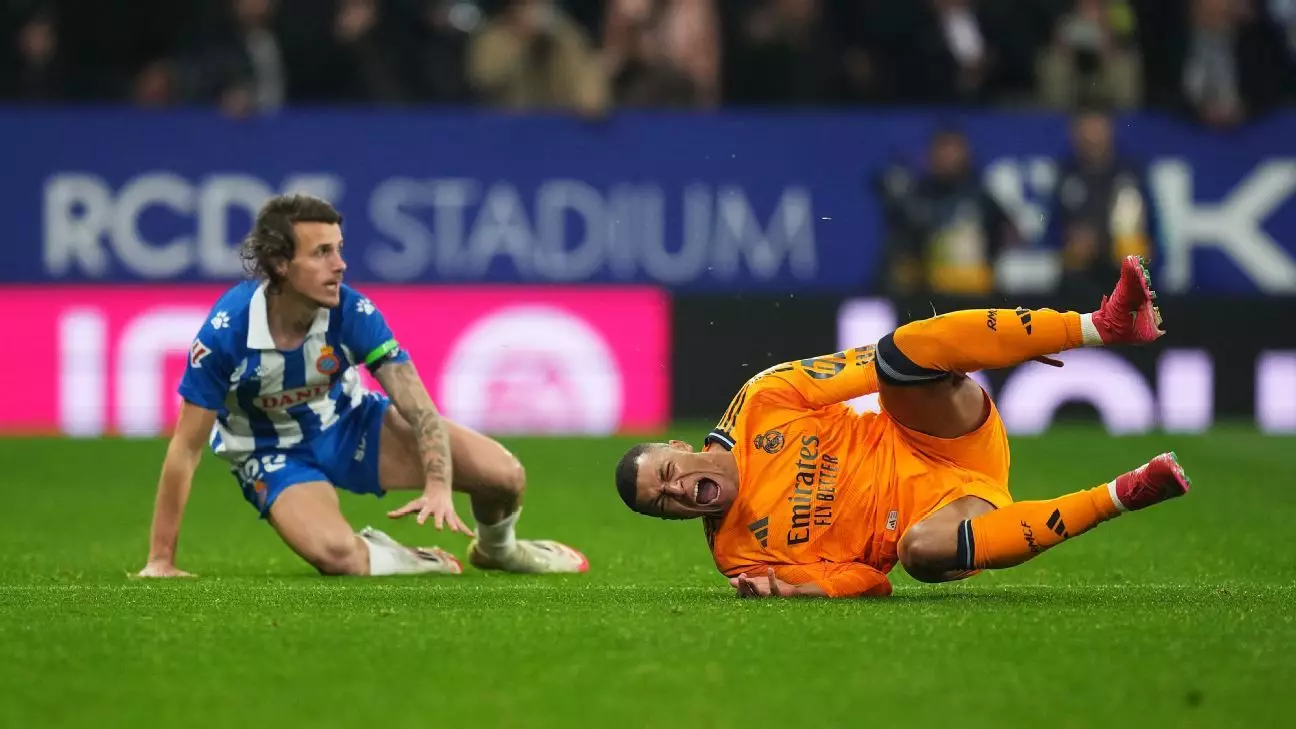Real Madrid, one of the most storied football clubs in the world, recently expressed significant dissatisfaction with the current state of officiating in LaLiga. Manager Carlo Ancelotti highlighted that the club’s formal complaint about refereeing decisions presents an opportunity for substantial change. This strong statement follows the club’s reactions to various controversial calls, particularly one involving Espanyol defender Carlos Romero, who was not sent off despite committing a foul against star player Kylian Mbappé. Romero’s subsequent performance—scoring the winning goal in the match—has intensified Madrid’s frustration and brought the issue of referee performance sharply into focus.
Madrid’s board has taken the unusual step of reaching out to the Spanish Football Federation (RFEF) and the Sports Ministry (CSD) with a letter detailing their grievances. They categorize the refereeing standards as “completely discredited,” citing a specific incident they view as indicative of a more extensive systemic problem. This statement reflects a growing sentiment not just within Real Madrid but across the league, where many clubs have voiced similar frustrations about officiating inconsistencies.
The significance of Madrid’s complaint cannot be understated. Ancelotti stated that the club seeks an explanation for what they perceive as inexplicable decisions made during matches. By calling for the release of audio from conversations between referees and VAR officials, Madrid is pressing for transparency—a request that underscores the club’s commitment to accountability in officiating. Ancelotti’s assertion that “if they don’t give an explanation, that means there’s a problem” encapsulates a desire for clarity and improvement in how the game is officiated.
The RFEF, in its response, criticized what it termed “generalized accusations,” stating that such claims erode trust in football as a whole. This statement underscores a broader tension in the relationship between clubs and governing bodies regarding the accountability and credibility of refereeing standards.
Ancelotti’s reflections on the state of refereeing resonate beyond Madrid, as clubs across the league share similar grievances. He emphasized that a widespread atmosphere of dissatisfaction indicates an opportunity for reform and improvement. This sentiment opens the door for potential changes that could redefine the officiating landscape in Spain, making it more equitable and consistent for all teams involved.
Madrid’s current situation is compounded by a growing injury crisis. With multiple key players sidelined, including critical defenders like Antonio Rüdiger and David Alaba, the challenges faced on the pitch are mirrored by challenges off it. Ancelotti’s acknowledgment of the club’s injury struggles, coupled with their refusal to strengthen the defense in the January transfer window, adds another layer of complexity to the club’s current situation.
As the team prepares for crucial fixtures, including the Madrid Derby and a Champions League encounter against Manchester City, the ability to field a competitive squad may directly influence their quest for silverware. Furthermore, Ancelotti’s tactical adjustments to cope with the injury crisis are a test of his managerial acumen and resourcefulness.
While Real Madrid is navigating these internal and external challenges, the call for reform in officiating cannot be overlooked. Clubs must work together with the RFEF to foster a more transparent system that ensures fairness in match outcomes. The ongoing situation sheds light on the broader issues within football governance, including accountability and the potential need for technology in enhancing officiating accuracy.
Real Madrid’s formal complaints about refereeing standards have sparked a meaningful discussion around the need for change within LaLiga. Ancelotti’s advocacy for improvement resonates widely, signifying a collective demand from the football community for a more credible and reliable officiating framework. As the club heads into a critical period of fixtures, their efforts to navigate both injuries and systemic governance challenges will shape their path forward—possibly redefining the intersection between sporting excellence and robust officiating standards in the process.

